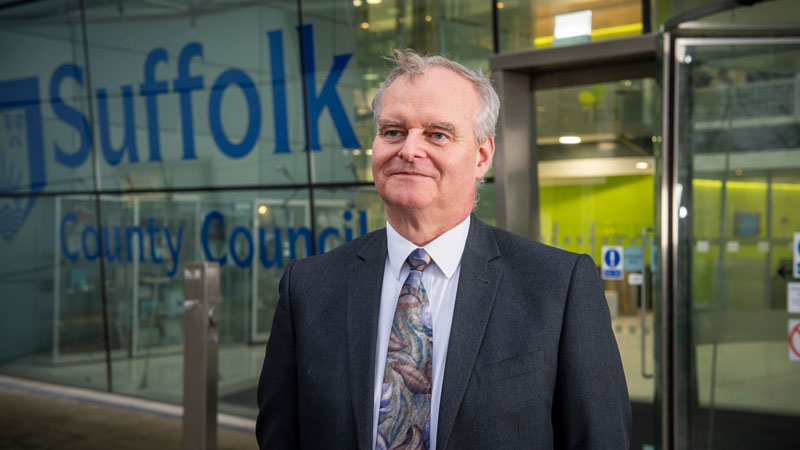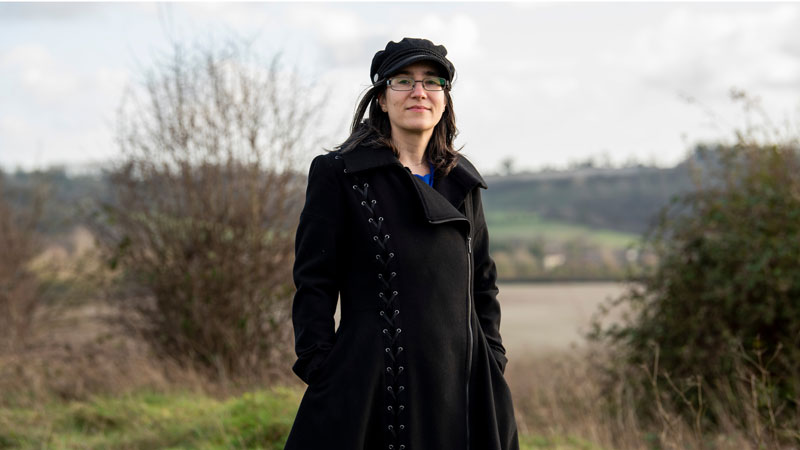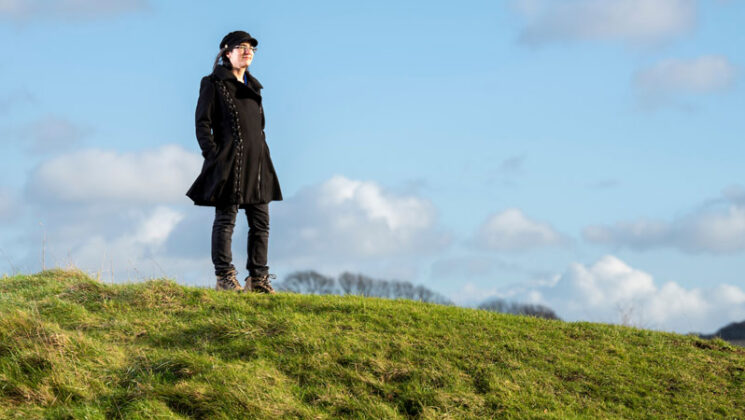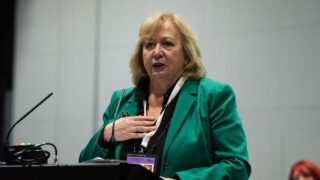Ilina Todorovska. All images: Marcus Rose
It’s far too easy to be pessimistic about climate change, not least when your own government leaves the COP27 climate talks and immediately signs dozens of new coal, gas and fracking licences. As Peter Frost notes: “That’s not with the programme at all.”
In contrast, Peter and fellow UNISON environmental officer (or green rep) Ilina Todorovska demonstrate exactly why we’re still in the fight to save the planet. Each has a passion and commitment that reflect the global community of environmentalists that is attempting to keep governments honest and on track. They also have encouraging news from their respective county councils, which are taking the challenge seriously.
As the environment strategy officer for Suffolk County Council, Peter is mainly focused on building a network of green oriented businesses through the Suffolk Carbon Charter, advising them on the many different ways they can reduce their carbon footprint, as well as that of their supply chains.
He speaks enthusiastically about some of their initiatives, whether it’s the nursery company that’s built two reservoirs to source its own water, or the printing firm that has created what Peter describes as a “field of solar panels” on the roof of its factory.
A purely sustainable county council
For its own part, Suffolk aims to become “a purely sustainable county council,” and carbon neutral by 2030. All the power in its own buildings is already being sourced from renewables such as wind and solar, and it’s currently transitioning its fleet of vans and cars to electric vehicles.
Turning the same initiative outwards, it has started Solar Together Suffolk, a group-buying scheme that enables people of all incomes to obtain solar panels, and has backed Plugin Suffolk, a plan to “bring everyone along with the electric vehicle revolution” by installing community charging hubs in the county’s isolated rural communities. The pilot scheme was so successful that the council has received funding from central government to continue.

In fact, before joining the council five years ago, Peter (pictured above) worked in the motor industry, where he was one of the first to champion the use of electric vehicles in the UK. And he sees the growth in electric cars as one indicator of society’s willingness to move forward.
Ilina is a minerals and waste planner for Hampshire County Council, part of the team which draws up the local plans which are used to determine planning applications for such things as quarries and landfills – balancing the need to maintain the supply of aggregates and minerals, with the protection of the environment and amenity of residents.
She has a master’s in environmental studies, is a chartered environmentalist, and has been in her current team for a decade. She happily declares that waste data “is a bit of a passion of mine”. And for good reason, as reliable data is integral to understanding how much waste is created (“all the things you put in your bin, all the waste that a factory produces, anything from agriculture, from industry, from retail”) and how most sustainably to deal with it.
Hampshire aims to be carbon neutral by 2050. It has put solar panels on some of its schools and is doing valuable work on environmental protection. Ilina is particularly proud of the fact that, in 2013, her team included a climate change policy in its minerals and waste plan, some six years before the council itself declared a climate emergency.
“It was quite advanced for its time, I think, and it still stands up fairly well.” That said, it was difficult to implement, partly because of council priorities, partly a “knowledge and implementation gap” that closes the more we learn about climate change. Thus, the team is currently updating its plan to include data it now understands that it needs, for example carbon assessments.
“What I’m pleased about is that we’re still focusing on it, that we’ve not said, ‘Fine, we’ve ticked the box’. We’re still trying to improve it.”
A diversity of voices
UNISON’s council members in general, and green reps in particular, have a key role in ensuring that councils’ good intentions are met by action.
Says Peter: “I’m literally pivotal. I know who to talk to in the council. And it’s fantastic that I’ve got the weight of UNISON behind me as well. We can help keep that momentum. With every issue that you raise, you’re just putting that little bit more pressure on people in power to do something.”
Ilina agrees: “Because of the political process, everything has to go through so many filters – committees, debates, approvals. Local authorities have always been slow beasts. I think one thing we’ve contributed already is just to push our authority to go that little bit faster.
“I think something that’s very important in any organisation, including the council, is a diversity of voices,” she continues. “To me, that means a diversity of life experience and ways of thinking. On environmental issues, that is also the role of the green rep, letting those voices come to the surface that sometimes may be lost in the machinery of the council.”

Ilina notes the many obstacles that remain in any local authority’s bid to be sustainable, whether it’s adequate knowledge and expertise, the lack of a properly holistic approach or, of course, money. “One question is, how are green initiatives going to be maintained amid large financial pressures? Hampshire has sounded the alarm that in a couple of years it’s going to be in a deficit. What’s going to be cut back? Is it some of these services that perhaps aren’t statutory, but are so important for our future?”
Both she and Peter feel that local authorities are crucial to the fight – in Peter’s words, “anchor organisations that are key to the transition to a low-carbon future”, not only changing their own approaches but influencing others to do the same. And he says: “I’ve got to give praise to Suffolk, because they’re very genuine. It’s not just greenwashing, they’re very, very committed.” Adds Ilina: “If we are brave, if we are visionary, if we forge ahead with these matters, I’m sure we will take others with us.”
So, can we avert climate catastrophe?
“It’s a very frustrating position I find myself in,” Peter says, “because as a technology-focused person, I know that energy should be free. Energy is all around us. In two minutes, enough solar energy hits the earth to power our entire civilization for a year. The fact that we’re not collecting it, storing it and using it properly, is not energy’s fault. We’ve set our society up completely wrong, to use the most expensive, most environmentally damaging energy we can possibly use. And a very similar argument comes up about water.”
But, in a way, this is why he remains defiantly optimistic, because we’re more than able to save ourselves. “If we just gave up and continued polluting the Earth, it would be game over. But everything we can do to steer the ship on a slightly different course extends the time that we’ve got to find the solutions that we need.
“I imagine a future generation looking back on the early 21st century. They’re gonna scratch their heads and say, ‘What were they thinking? They used to dig oil up out of the ground and burn it? They paid for energy?!’ I do believe that, as long as we survive this climate crisis we’re facing, we’ll appreciate how much more logical and how much better society can be.”
And despite her pragmatism, Ilina agrees. “I’m sure we can do it. The way I like to think about it, is to make it smaller. I’m doing my bit, today it may be a little, tomorrow it might be bigger, it all adds up. Don’t let perfect be the enemy of good. Everybody’s efforts are worthwhile.
“This is the union way: people power, a lot of us pulling in a certain direction. We can do it, because we’re not alone.”
Follow UNISON’s campaigning environmental work online at Green UNISON: www.unison.org.uk/our-campaigns/green-unison/







2 thoughts on “A Greener Planet”